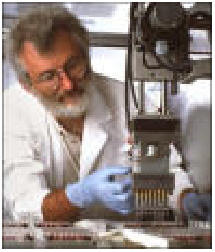
Sydney Brenner
Salk Institute for Biological Studies

Sir John Sulston
Cambridge University
Robert Horvitz
Massachusetts Institute of Technology
BRITONS Sydney Brenner, 75, and John E. Sulston, 60, and American H. Robert
Horvitz, 55, shared the prize, worth about $1 million.
Working with tiny worms, the laureates identified key genes
regulating organ development and programmed cell death, a necessary process
for pruning excess cells.
“Knowledge of programmed cell death has helped us to understand the
mechanisms by which some viruses and bacteria invade our cells,” the
institute said.
“We also know that in AIDS, neurogenerative diseases, stroke and
myocardial infarction, cells are lost as a result of excessive cell death.”
Brenner, a professor at the Salk Institute for Biological Studies in
La Jolla, Calif., is also the founder of the Molecular Sciences Institute in
Berkeley. He broke new ground by showing that a chemical could produce
specific genetic mutations in the roundworm, the Nobel Committee said.
Different mutations could then be linked to specific effects on organ
development.
Sulston, of the
Sanger Center at England’s Cambridge University, discovered that certain
cells in the developing worm are destined to die through programmed cell
death. He demonstrated the first mutations of genes that participate in that
process, the committee said.
Horvitz, of the Massachusetts Institute of Technology, identified the
first two “death genes” in the worms and showed that humans have a gene
similar to one of them, the committee said. Scientists now know that most
genes controlling cell death in the worms have counterparts in humans.
Information about programmed cell death has helped scientists
understand how some viruses and bacteria invade human cells, the committee
said. In conditions such as AIDS, stroke and heart attack, cells are lost
because of excessive cell death. In other diseases like cancer, cell death
is reduced, leading to the survival of cells that are normally destined to
die.
